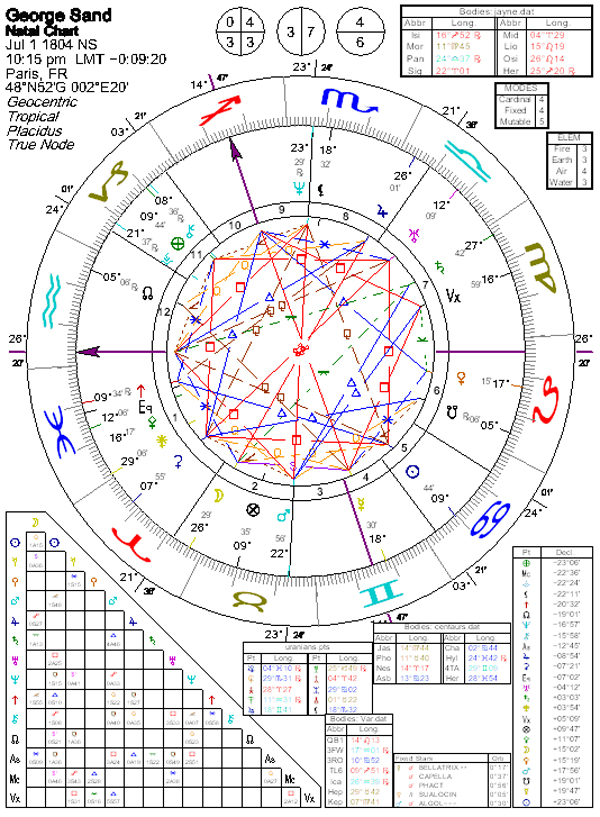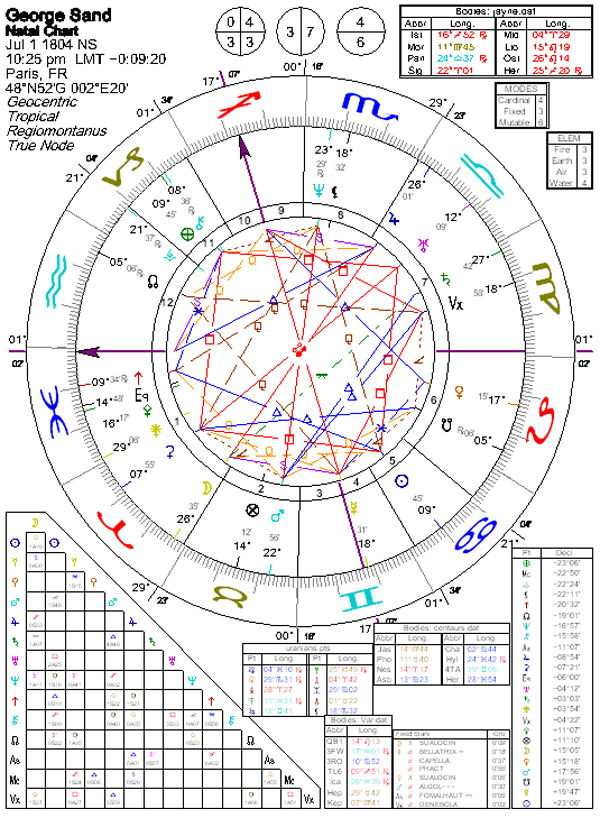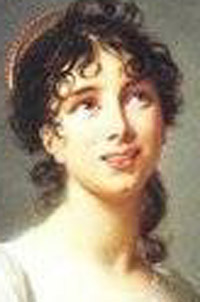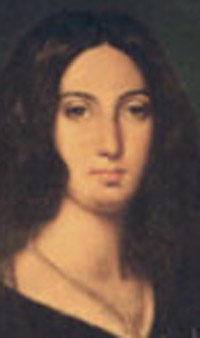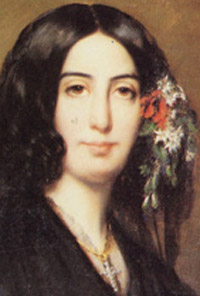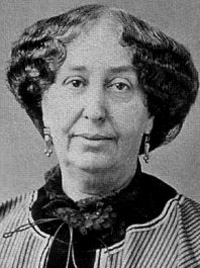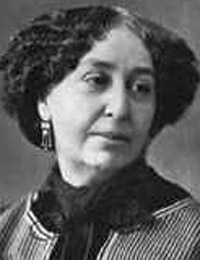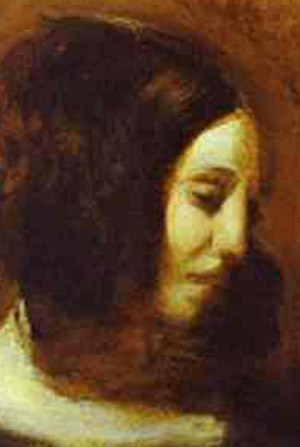George Sand
Copyright Michael D. Robbins 2005
Astro-Rayological
Interpretation & Charts
Quotes
Biography
Images and Physiognomic Interpretation
George Sand—French Novelist, “Bohemian”
July 1, 1804, either 10:15 PM or 10:25 PM, Paris, France. (Source: Sabian Symbols) Died, June 6, 1871, Nohant, France.
Sun, Cancer; Ascendant either late Aquarius or very early Pisces; Moon, Aries; Mercury, Gemini; Venus, Leo; Mars, Taurus; Jupiter and Uranus in Libra, with Uranus square Sun; Neptune, Scorpio; Pluto, rising in Pisces.
George Sand was a well-known French novelist who dressed as man and wrote under male pseudonym to publish her novels: She is best known for her flagrant non-conformity. She rebelled against the role assigned to women in the nineteenth century, and became, perhaps, the century's most notorious bohemian. This behavior is indicated through the sign Aquarius. Throughout her many love affairs, she frequently maintained the maternal attitude which distinguishes Cancerians.
One of the major conflicts in her life centered around the decision to leave her family (Cancer) for the attractions of a progressive, literary, bohemian society (Aquarius). As the soul calls for one to follow the dictates of one's Rising Sign, it would seem that Sand acted correctly from a spiritual point of view. (Examine her character more closely for signs of sixth and fourth rays.
Charity degrades those who receive it and hardens those who dispense it.
Don't walk in front of me, I may not follow. Don't walk behind me, I may not lead. There is only one happiness in life, to love and be loved.
Life in common among people who love each other is the ideal of happiness.
The artist vocation is to send light into the human heart.
(Sun in Cancer in 5th house. Neptune in 9th house.)The beauty that addresses itself to the eyes is only the spell of the moment; the eye of the body is not always that of the soul.
There is only one happiness in life, to love and be loved.
Women love always: when earth slips from them, they take refuge in heaven.
Work is not man's punishment. It is his reward and his strength and his pleasure.
(Venus in 6th house)Can one thus resume one’s self? Can one know one’s self? Is one ever somebody? I don’t know anything about it any more. It now seems to me that one changes from day to day and that every few years one becomes a new being.
The trade of authorship is a violent, and indestructible obsession.
The Letters of I regard as a mortal sin not only the lying of the senses in matters of love, but also the illusion which the senses seek to create where love is only partial. I say, I believe, that one must love with all of one’s being, or else live, come what may, a life of complete chastity.
(Jupiter in Libra in 8th house. Uranus & Saturn in 7th house.)The beauty that addresses itself to the eyes is only the spell of the moment; the eye of the body is not always that of the soul.
No one makes a revolution by himself; and there are some revolutions ... which humanity accomplishes without quite knowing how, because it is everybody who takes them in hand.
He who draws noble delights from the sentiments of poetry is a true poet, though he has never written a line in all his life.
It is sad, no doubt, to exhaust one’s strength and one’s days in cleaving the bosom of this jealous earth, which compels us to wring from it the treasures of its fertility, when a bit of the blackest and coarsest bread is, at the end of the day’s work, the sole recompense and the sole profit attaching to so arduous a toil.
Once my heart was captured, reason was shown the door, deliberately and with a sort of frantic joy. I accepted everything, I believed everything, without struggle, without suffering, without regret, without false shame. How can one blush for what one adores?
(Mars opposition Neptune).
(On her newfound religious faith.)If they are ignorant, they are despised, if learned, mocked. In love they are reduced to the status of courtesans. As wives they are treated more as servants than as companions. Men do not love them: they make use of them, they exploit them, and expect, in that way, to make them subject to the law of fidelity.
“One is happy as a result of one's own efforts once one knows the necessary ingredients of happiness simple tastes, a certain degree of courage, self denial to a point, love of work, and above all, a clear conscience.” quote
“We cannot tear out a single page of our life, but we can throw the whole book in the fire” quote
(Moon in Aries)“You can bind my body, tie my hands, govern my actions: you are the strongest, and society adds to your power; but with my will, sir, you can do nothing.” quote
(Pluto in 1st house trine Sun)“Life resembles a novel more often than novels resemble life.” quote
“The prayers of a lover are more imperious than the menaces of the whole world” quote
“Vanity is the quicksand of reason” quote
“Every historian discloses a new horizon” quote
“No human creature can give orders to love” quote
“Admiration and familiarity are strangers” quote
“I have no enthusiasm for nature which the slightest chill will not instantly destroy” quote
“Simplicity is the most difficult thing to secure in this world; it is the last limit of experience and the last effort of genius.” quote
“One changes from day to day, and...after a few years have passed one has completely altered.” quote
“Try to keep your soul young and quivering right up to old age, and to imagine right up to the brink of death that life is only beginning. I think that is the only way to keep adding to one's talent, and one's inner happiness.”
It is a mistake to regard age as a downhill grade toward dissolution. The reverse is true. As one grows older, one climbs with surprising strides.
The capacity for passion is both cruel and divine.
I ask the support of no one, neither to kill someone for me, gather a bouquet, correct a proof, nor to go with me to the theater. I go there on my own, as a man, by choice; and when I want flowers, I go on foot, by myself, to the Alps.
(Moon in Aries.)My profession is to be free.
(Uranus T-squaring Sun & Chiron)Liszt said to me today that God alone deserves to be loved. It may be true, but when one has loved a man it is very different to love God.
The mind has no sex.
The old woman I shall become will be quite different from the woman I am now. Another I is beginning.
But if these people of the future are better than we are, they will, perhaps, look back at us with feelings of pity and tenderness for struggling souls who once divined a little of what the future would bring.
Discouragement seizes us only when we can no longer count on chance.
Fame and admiration weigh not a feather in the scale against friendship and love, for the heart languishes all the same.
Learned women are ridiculed because they put to shame unlearned men.
Love without reverence and enthusiasm is only friendship.
Lying, like license, has its degrees.
O heart! love is thy bane and thy antidote.
The life of great geniuses is nothing but a sublime storm.
There are no greater prudes than those women who have some secret to hide.
To forgive a fault in another is more sublime than to be faultless one's self.
Weeds are omnipresent; errors are to be found in the heart of the most lovable.
Happiness lies in the consciousness we have of it, and by no means in the way the future keeps its promises.
Handsome Lawrence (ch. III)In addition, Sand authored literary criticism and political texts. Her most widely used quote being, "There is only one happiness in life, to love and be loved." Also, she was one of the few female pipe smokers.
She was known well in far reaches of the world, and her social practices, her writings and her beliefs prompted much commentary, often by other luminaries in the world of arts & letters. A few excerpts demonstrate much of what was often said about George Sand:
"She was a thinking bosom and one who overpowered her young lovers, all Sybil — a Romantic." V.S. Pritchett (writer)
"What a brave man she was, and what a good woman." Ivan Turgenev (novelist)
"The most womanly woman." Alfred de Musset (poet)
George Sand
Born in Paris to a father of aristocratic lineage (a grandaughter of Maurice, comte de Saxe and a distant relative of Louis XVI) and a commoner mother, Sand was raised for much of her childhood by her grandmother at the family estate, Nohant, in the French region of Berry, a setting later used in many of her novels. In 1822, she married Baron M. Casimir Dudevant (1795–1871), and they had two children, Maurice (1823–1889) and Solange (1828–1899). In 1835, taking the children with her, she left her husband and converted to a Jewish faith[citation needed].Her first published novel, Rose et Blanche (1831) was written in collaboration with Jules Sandeau, from whom she allegedly took her pen name, Sand. Her reputation was questioned when she began sporting menswear in public---the clothes being far sturdier and less expensive than a noble woman's dress. This male "disguise" also enabled Sand to circulate more freely about Paris, and gave her increased access to venues that might have been denied to a woman of her social standing. This was an exceptional practice for the 19th century, where social codes — especially in the upper class — were of the highest importance. As a consequence Sand lost many of the privileges attached to being a Baroness. Ironically, the mores of this period allowed women of higher classes to live physically separated from their husbands without losing face, provided they did not show any blatant irregularity to the outer world.
She was linked romantically with Alfred de Musset (summer 1833-March 1834), Franz Liszt and Frédéric Chopin (1810-1849) whom she had met in Paris in 1831. Later in life, she corresponded with Gustave Flaubert; despite their obvious differences in temperament and aesthetic preference, they eventually became close friends.
She was engaged in an intimate friendship with actress Marie Dorval, which led to widespread but unconfirmed rumors of a lesbian affair. [1].
In Majorca one can still visit the (then abandoned) Carthusian monastery of Valldemossa, where she spent the winter of 1838–39 with Frédéric Chopin and her children. [2] This trip to Mallorca was described by her in Un Hiver à Majorque ("A Winter in Mallorca"), published in 1855. George Sand left acute observations on her book "Winter in Majorca" on the mistreatment she and Chopin had to endure. She noted the contrast between the beauty of the island, which could be a form of Paradise were it not for its native population with "idiots and thieves" in abundance. Unfortunately they have not been the only genial artists or foreigners to be treated that badly, the contrast noted by Sand goes until our day, but the natural beauty of the island has been reduced very much by the ever-growing drive of building sector. In fact, the whole historic and artistic heritage of Majorca, already much destroyed, is under threat of complete destruction, including the Royal Chartreuse of Jesus of Nazareth where Chopin and Sand lived for a short period, because of widespread corruption in the building sector in collusion with the local "caciques" politicians.
She left Chopin shortly before he died from tuberculosis.
George Sand died at Nohant, near Châteauroux, in the Indre département of France on June 8, 1876 at the age of 72 and was buried in the grounds of her home at Nohant. In 2004, controversial plans were suggested to move her remains to the Panthéon in Paris.
French Romantic writer, noted for her numerous love affairs with such prominent figures as Prosper Merimée, Alfred de Musset (1833-34), Frédéric Chopin, (1838-47), Alexandre Manceau (1849-65), and others. The painter Eugène Delacroix (1798-1863) did not take her very seriously, but Alexander Herzen and Francois-Rene de Chateaubriand were inspired of her work. Widespread critical attention accompanied the publication of most of Sand's novels from INDIANA (1832), a story of a naive, love-starved woman abused by her much older husband and deceived by a selfish seducer. Sand's works influenced among others Fedor Dostoevskii, Lev Tolstoi, Gustave Flaubert, and Marcel Proust. In 1842, the English critic George Henry Lewes wrote that Sand was ''the most remarkable writer of the present century.''
"We cannot tear out a single page of our life, but we can throw the whole book in the fire. " (from Mauprat, 1837) was born in Paris and brought up in the country home of her grandmother. She received education at Nohant, her grandmother's estate, and at Couvent des Anglaises, Paris (1817-20). In 1822 she married the baron Casimir Dudevant, to whom she bore one son and one daughter. She inherited Nohant in 1821, but because of her unhappy marriage, she left her family in 1831 and returned to Paris.
In 1831 Sand started to write for Le Figaro. She contributed Revue des Deux Mondes (1832-41) and La République (1848), and was a coeditor of Revue Indépendante (1841). During these years she mad acquaintance with several poets, artists, philosophers, and politicians, and wrote in a few weeks with her lover Jules Sandeau a novel, ROSE ET BLANCHE, under the pseudonym Jules Sand. The second novel Indiana (1832) was written by herself and gained an immediate fame. It was followed by VALENTINE (1832), and LÉLIA (1833). After reading Indiana the poet Alfrted de Musset wrote an admiring letter to Sand which marked the beginning of their passionate affair. At the age of 33 she started an affair with Chopin. The composer, however, did not first consider her attractive. "Something about her repels me," he said to his family. Their relationship ended in 1847 when Sand started to suspect that the composer had fallen in love with her daughter, Solange. It is also possible, that behind the breakup was Sand's treatment of Solange.
In her early works Sand's writings show the influence of the writers with whom she was associated. In the 1830s several artists responded to the call of the Comte de Saint-Simon of cure the evils of the new industrial society, among the Franz Listz and Sand who became friends, not lovers. On a personal level, Michel de Bourges, who preached revolution, was more important. After de Bourges came Pierre Leroux, who was against property and supported the equality of women, and wanted to rehabilitate Satan. From the 1840s Sand found her own voice in novels, which had roots in her childhood's peasant milieu. For the rest of her life, Sand was committed to ideal of Socialism, which his friend Flaubert rejected in their dispute. After the 1848 revolution in France failed, Sand settled disappointed at Nohant. From 1864 to 1867 she lived in Palaiseau, near Versailles.
Sand spend the rest of her life writing and travelling. "Work is not man's punishment. It is his reward and his strength, his glory and his pleasure." During her career she played an important, if long underestimated, role in the evolution of the novel. Her books, although popular, awoke also controversy: the French Senate recognized its opposition to the presence of Sand's works in public libraries. In her novels Sand questioned the sexual identity and gender destinies in fiction. Sand herself was accused of lesbianism and nymphomania, partly because of affairs with well-known celebrities. In CONSUELO (1843) the musically gifted heroine defies the tragic destiny depicted in Madame de Staël's Corinne (1807). In her mid-life autobiography, HISTOIRE DE MA VIE (1854-55, Story of My Life), Sand displaces conventional distinctions separating male from female, fact from fiction, and public from private life. "Life in common among people who love each other is the ideal of happiness."
Among Sand's best works are her countryside novels LA MARE AU DIABLE (1846), in which Germain, a young widower, must choose between a rich woman and a poor girl, FRANÇOIS LE CHAMPI (1847-48), LA PETITE FADETTE (1849), and LES MAÎTRES SONNEURS (1853). In LUCREZIA FLORIANI (1846) Sand depicted her relationship with Frédéric Chopin (Prince Karol de Roswald in the book). HORACE (1842) was an examination of the young generation enthused by the ideals of Romanticism. She also wrote memoirs, short stories, essays and fairy tales. Sand died on June 8, 1876. Sand's literary reputation started to decline after her death, and in the beginning of the 20th century, her work did not attract much attention. "The world will know and understand me someday," Sand once wrote to her critics. "But if that day does not arrive, it does not greatly matter. I shall have opened the way for other women."
